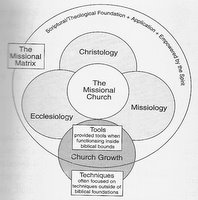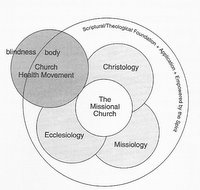
So, I'm reading
Breaking the Missional Code by
Ed Stetzer and David Putnam right now (yeah, I'm reading
Velvet Elvis, too; and believe it or not, I'm also reading
Olympos, some good sci-fi by
Dan Simmons before bedtime each night!) and the book makes some pretty interesting observations, including some thoughts regarding George Barna's "revolutionaries."
I haven't read
Barna's book, but I'm going to the
Revolution Conference with
D.G. Hollums next week, so I'm curious to see what I learn there and how it compares to Stetzer and Putnam's analysis.
Here's their analysis in brief. I'm including the diagrams from the book which will hopefully help keep this as clear as possible.
First of all, for a church to be truly
missional, it has to include a healthy balance of three things: christology (Who is Jesus and what has he sent us to do?), ecclesiology (What expression of a NT church would be most appropriate in this context?), and missiology (What forms and strategies should we use to most effectively expand the kingdom where we are sent?). This is the "The Missional Matrix." Here's their diagram:

This is the starting point for understanding their next three diagrams. Each of these diagrams shows what they consider to be the truly missional church in the center with an equal emphasis on the three parts of the missional matrix.
The first model they demonstrate is the Church Growth movement of the 1960's, 70's, and 80's. The weakness of the church growth movement (which began with Donald MacGavran and continued with Peter Wagner, both of whom were at
Fuller Seminary, my alma mater) was that it soon "sank into a church methods focus, many times without a foundation in scriptural truth. Thus, it strayed slightly outside of scriptural foundation and application" (p. 54). It's the typical "use this megachurch's methods and see phenomenal growth in your (vastly different) setting!" Usually didn't work. Here's that diagram:

The problem you can see in this diagram is that it overlaps with ecclesiology and missiology, but since it doesn't have a focus on christology, it can't be called a missional church.
The next diagram is the Church Health movement of the 1990's. "This movement centered on how the church body was related to Christ, and what was the best form of church (ecclesiology) in order for the church to be healthy." The problem with this movement was that "this inward focus resulted in blindness to the community, blindness to other races, and blindness to other approaches" (p. 55).

You can see in the diagram that "church health" focuses on christology and ecclesiology, but not missiology, so it also isn't considered missional.
Now we come to the third model, which Stetzer and Putnam suggest represents Barna's "revolutionaries." In this diagram, you can see that there is a focus on christology and missiology, but not much in the way of ecclesiology. You will, however, notice that there is some overlap with the missional church. Here's that diagram:

Stetzer and Putnam seem to suggest two things. The first is that these "revolutionaries" have the best shot so far of being a truly missional church (demonstrated by the overlap in the diagram). Secondly, however, they also run the risk of having "an undeveloped idea of what the church is--as described by the Scripture, not by the modern notion of church" (p. 57). The danger is syncretism.
I don't know... I haven't explored this enough to know yet if I agree or not. I'm excited about the new things that are going on with the church. My friend D.G.'s (who I think is a revolutionary)
organic gatherings are exactly what some people need in order to find community and a connection with God.
I think we need to keep pushing and discovering new ways of doing church, but Stetzer and Putnam offer a thoughtful reminder to make sure we have a healthy ecclesiology as we explore this revolution.
 Well, I finally finished reading Velvet Elvis. I know... some of you are wondering, "What took you so long?! The book's not that long!"
Well, I finally finished reading Velvet Elvis. I know... some of you are wondering, "What took you so long?! The book's not that long!"









































